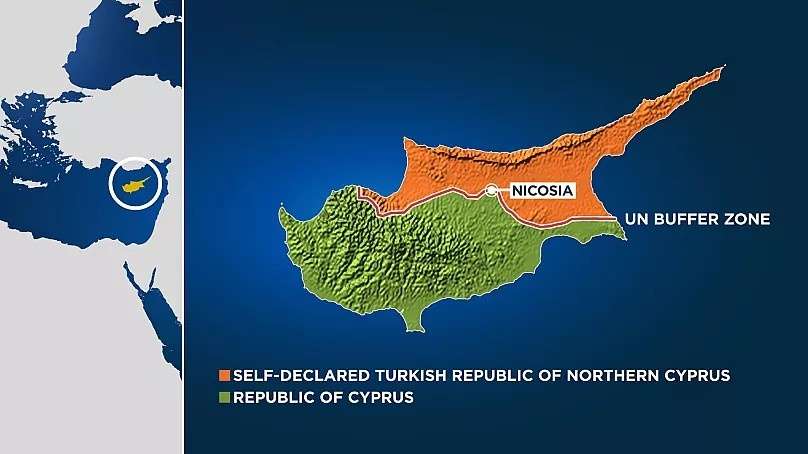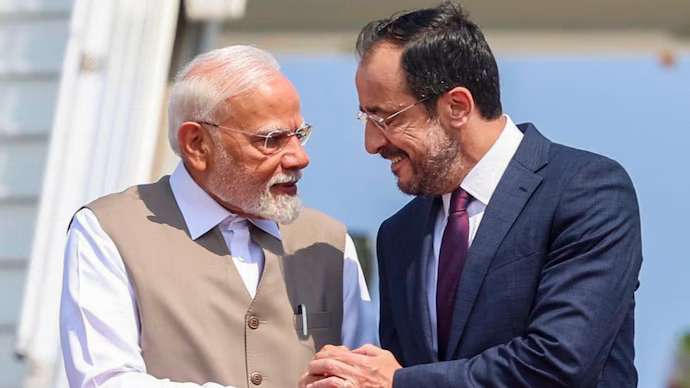The visit of Prime Minister Narendra Modi to Cyprus on 15/16 June 2025 is historic as it represents the first visit of an Indian Prime Minister to Cyprus in more than twenty years. Indicative of historic and growing friendship between India and Cyprus, the visit reaffirmed the important strategic dimension of the relationship, reaffirmed shared values and addresses shared geopolitical challenges particularly posed by Turkish expansion in the eastern Mediterranean.
A Historic & Iconic Moment
- First Visit in Over 20 Years: This is the first visit by an Indian Prime Minister to Cyprus in over two decades. The visit was historic to reaffirm the bilateral deep and historic friendship shared between the countries.
- Reaffirmation of Friendship: The visit reaffirmed not only the traditional historical ties, but reaffirmed a forward-looking partnership based on a shared strategic vision, mutual trust, and respect – along with the dynamic and evolving bilateral relationship.
Strategic and Diplomatic Angle – The “Turkey Angle” and more: The visit is being viewed by many as a strategic signal – especially directed at Turkey, which has paved the pathway for closer ties with Pakistan.
- Turkey-Cyprus Rivalry (Cyprus is an island in the eastern Mediterranean Sea – and located almost next to Turkey).Turkey and Cyprus have a long history of rivalry based on the 1974 invasion of the island of Cyprus which led to the northern part proclaiming independence as the Turkish Republic of Northern Cyprus which was only recognized by Turkey.

- India’s stance against Turkish support of Pakistan: Turkey has backed Pakistan regarding international resolutions and statements on Kashmir. Furthermore, during a recent conflict, drones of Turkish origin were reportedly used by Pakistan against India, which India views as having “crossed a line”.
- Anti-Terrorism Support: Prime Minister Modi stated that this three-nation tour (including Cyprus) was an opportunity to “thank partner countries for their steadfast support to India in our fight against cross-border terrorism, and to galvanize global understanding on tackling terrorism in all its forms and manifestations”. This underscores the diplomatic move to acknowledge allies who support India’s security concerns.
- Cyprus as a “Dependable Friend”:
- It supports India’s candidature for a permanent seat in an expanded UN Security Council.
- It has provided full support for the India-US Civil Nuclear Agreement within the Nuclear Suppliers Group (NSG) and the International Atomic Energy Agency (IAEA).
Broader Diplomatic and Strategic Pillars of the Partnership: Beyond the immediate strategic signaling, the visit underscored a multifaceted partnership.
Shared Values and Global Commitments
Both leaders highlighted a shared commitment to peace, democracy, the rule of law, effective multilateralism, and sustainable development.
- They reaffirmed support for a rules-based international order based on the UN Charter, international law, and UNCLOS (specifically regarding freedom of navigation and sovereign maritime rights).
- They also reaffirmed unwavering support for the sovereignty and territorial integrity of all nations.
Discussions on Bilateral, Regional, and Global Issues: The leaders held wide-ranging discussions on bilateral issues, regional matters, and global concerns, emphasizing the breadth and depth of their cooperation. Detailed discussions were held on global issues such as the Middle East and the war in Ukraine.
Cooperation in Key Sectors: Cyprus and India aim to deepen cooperation in critical sectors, acting as trusted and indispensable partners in promoting regional and global peace, prosperity, and stability. This includes appreciating recent advances in economic cooperation, technological collaboration, and people-to-people ties.
Coordination in International Organizations
- They agreed to strengthen coordination within international organizations like the United Nations and the Commonwealth.
- They committed to implementing the 2024 APA Commonwealth Ocean Declaration, highlighting ocean governance as a pillar of global sustainability and resilience.
- They also noted the inaugural Commonwealth Ocean Ministers Meeting in April 2024 in Cyprus and the establishment of the Blue Charter Centre of Excellence.
- Both leaders agreed on the need for reform of the United Nations Security Council to make it more effective, efficient, and representative of contemporary geopolitical realities, reiterating support for intergovernmental negotiations on UNSC reform. They supported a reformed multilateralism to better address current global challenges.
Economic Corridor and EU Ties
- Its geographic location makes it a crucial part of the India-Middle East-Europe Economic Corridor (IMEC), an infrastructure project expected to boost trade and connectivity.
- Cyprus is set to hold the Presidency of the Council of the EU in the first half of 2026, positioning it as a crucial ally for India in building stronger trade and security ties with Europe.
The visit was iconic not just for being the first in over two decades, but also for its multifaceted diplomatic messaging, solidifying a crucial strategic partnership, affirming shared global values, and addressing geopolitical concerns, particularly in relation to Turkey.

